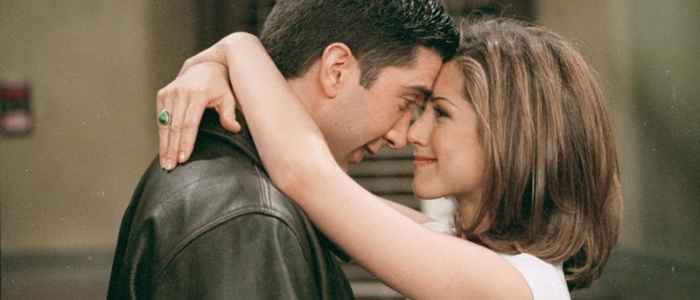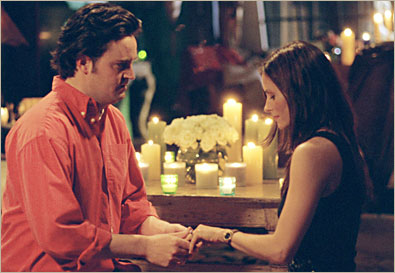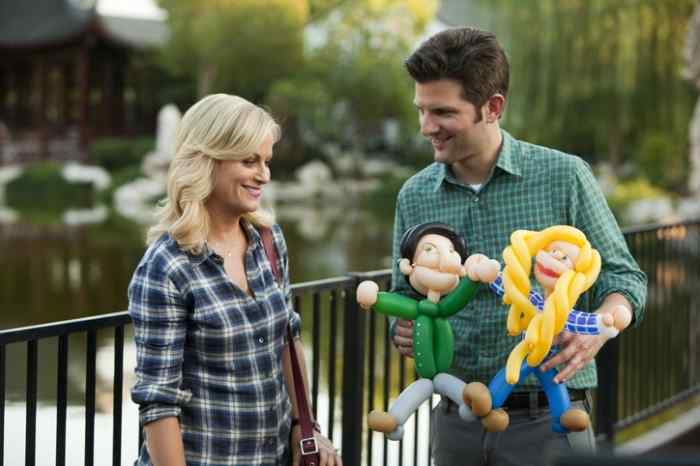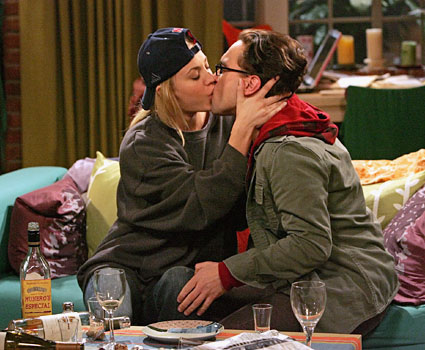Relationship Gender Roles in Sitcoms: For Better or For Worse?

In the past 20 years, prime-time television has shown that relationships come in all shapes and sizes. The image of a tall, confident and arrogant man with his submissive, obedient housewife who takes care of their two school-age children has not been prominent on TV for decades. This is especially true of sitcoms. Comedies offer a wide variety of non-traditional gender roles because writers have more opportunities to be creative on topics that are normally controversial, such as race, gender and mental health. There is less of an emphasis on being serious because audiences normally do not expect serious views and portrayals from sitcoms. They want to be entertained. They want to laugh. Almost every sitcom in the past twenty years features at least one relationship where unconventional gender roles are dominant. Strong examples of this are Friends, Parks and Recreation and The Big Bang Theory.
Ross and Rachel (Friends)
Friends is one of the most well-known sitcoms and, despite having ended over a decade ago, is still relevant today. Airing in 1994 and ending in 2004, Friends centers around the lives of a group of friends living in New York City. Over the course of ten years, the main characters have been in a countless number of serious relationships. The most prominent being between Ross and Rachel. In Ross and Rachel’s relationship, there are many stereotypical examples of gender roles that have been used heavily in pop culture. The geeky adolescent who falls in love with the popular girl in school. The boyfriend who is always jealous of the men in his girlfriend’s life, even if nothing is actually going on. The woman who blames everything on her boyfriend and doesn’t hold herself accountable at all.
A key example of Rachel not holding herself accountable for her actions in the third and fourth seasons that attributed to breaking up multiple times. After breaking up due to Ross feeling Rachel is too busy for their relationship, Ross sleeps with someone. They get back together almost immediately, but they break up again after Rachel finds out. Once again, they get back together at the end of the third season, but break up again in first episode of the fourth season when Rachel forces Ross to take full responsibility of the breakup. Ross responds with, “We were on a break,” and they do not get back together until the final episode of the series.
Claiming the female in a relationship is always a victim paints a negative picture on men. If anything goes wrong in a relationship, it is often speculated that always the man’s fault, and the female is the victim. Before this, it was portrayed that a man can never be wrong and a female can never be right. Have gender roles portrayed in relationships on television changed for the better? Perhaps, but it is more accurate to say that they’ve progressed as society changes. Life and society doesn’t stand still. It will continue to change. Sometimes it’s for the worse. Sometimes its for the better. Nothing ever stays permanent, and that includes gender roles both in society and in pop culture.
Chandler and Monica (Friends)
Chandler and Monica’s relationship is quite a contrast to Ross and Rachel’s relationship and established gender norms. Like Ross and Rachel, they start out as friends, but the gender roles are switched. Monica is portrayed as more masculine, and Chandler is portrayed as more feminine. Monica is obsessive compulsive with cleanliness and is particular about having things a certain way. She is also bossy and controlling and there are times where the other main characters are intimidated by her. Although Monica is more dominant than Chandler, Chandler does keep Monica grounded and often emotionally supports Monica, despite having come from a broken home and having commitment issues in earlier seasons. This not only shows progression in gender roles, but also that gender doesn’t necessarily define an individual’s characteristics and personality.

Ben and Leslie (Parks and Recreation)
Parks and Recreation is also a show where the gender roles have switched. Centered around the Parks and Recreation department in fictional Pawnee, Indiana and featuring a wide variety of eccentric characters, there are many relationships that defies normal gender roles.
The relationship that stands out the most in Parks and Recreation is between Ben and Leslie. Similar to Chandler and Monica, Leslie is determined and goes out of her way to plan everything to every little detail. Ben is non-confrontational, and is on the nerdy side. Leslie is, of course, the dominant of the two and often takes control of everything while Ben goes with the flow. There is an interesting dynamic between the two because Ben is often shown as by-the-book and adheres to the rules at all times while Leslie is creative with finding solutions to difficult, hard-to-resolve problems. This isn’t an example of reverse gender roles, but more of a mix of gender roles. When females are portrayed as hardworking individuals, they are often single with no children. Now, there are countless examples on sitcoms of working moms trying to balance their work and family life (Modern Family, The Office, The Middle).

Leslie takes “hard-working workaholic” to a whole new level. Leslie is a woman who never slows down, and she would never fit the traditional female image of a soft-spoken wife who gives up her career in order to take care of her children. Even after she gives birth to triplets, Leslie shamelessly says in in the first episode of the seventh season, “This could be my crowning achievement. I could retire. I mean, I wouldn’t. I’m going to work until I’m 100, then cut back to four days a week. Oh God, I’m already so bored thinking about that one day off. Maybe I’ll go to law school or something.” Leslie is always going to be attached to her work no matter what her personal circumstances are. That’s just who she is as a person. Although she is hardworking and goes out of her way to reach her goals and find resolutions to her problems, she is still a human being and needs the support of her spouse, friends and family.
Men are often thought as being emotionless and masculine. Similar to Chandler from Friends, Ben is portrayed as man who is weak and non-confrontational. They, however, provide emotional support for their wives and are there when they need them. This is a pleasant progression from the standard image of a man just solely provides financial support for their spouse and not showing any emotion. Ben is slightly different because he is more logical than emotional, but because Ben is so non-confrontational, he is socially awkward and he defies the traditional image of a stoic, confident man who knows what to do in every situation.
Andy and Ann/Andy and April (Parks and Recreation)
Andy is portrayed as lovable but unintelligent. He’s been in two relationships where the gender roles shifts from one spectrum to the other. With his relationship with Ann, Ann was the responsible one with a stable job while Andy was more like a man-child, since he was
irresponsible and was not able to hold a job. This, of course, causes a negative view on the male gender. It makes us question how it’s even possible for a man to not only be unable to take care of himself, but to also be supported by a woman. It goes against societal norms. Even after they break up, Andy remained dependent on Ann. For example, Andy lived in the pit next to Ann’s house in the sixth episode of the second season and, as a nurse, helped him with his recovery. Ann, of course, felt obligated to take care of him, but despite Andy’s best efforts to try to get back together with Ann, she is just in a different place than he is in their lives.

When Andy starts his relationship with April, his role shifts because of their significant age difference. Although Andy is still unemployed in the beginning of their relationship, April doesn’t financially support him, mostly because she being financially supported by her parents. As their relationship and careers progress, they slowly become adults. The gender roles in their relationship seem less significant because their personalities and lifestyles are so similar that their genders become irrelevant. They are who they are.

Penny and Leonard (The Big Bang Theory)
The Big Bang Theory centers around a group of friends who mostly consists of socially awkward geniuses, the show features relationships that continually challenge established relationship gender roles. The relationship between Penny and Leonard is similar to Monica and Chandler’s relationship from Friends and Ben and Leslie’s relationship from Parks and Recreation, where the man has more female characteristics and the woman has more male characteristics. At the same time, the man is emotionally supporting the female when she’s dealing with a crisis or difficult situation. The difference here is that there’s an emphasis that Penny is dealing with commitment issues and is unable to voice her true feelings for Leonard. Traditionally, this has been portrayed more of a male issue in pop culture, like with Chandler. Monica, like Leonard, is ready for marriage, but Chandler, like Penny, is afraid to commit to it because of various insecurities. This became so much of a problem for Penny and Leonard that Leonard tells Penny that she should purpose to him when she’s ready.

Their relationship strengthens when, thanks to Stuart, they are reminded that because of their relationship, each of them has changed significantly. Leonard has gotten more comfortable being outside of his comfort zone. Penny has been been improving her life and increasing her knowledge. This shows that there has been a significant amount of personal growth both as individuals and as a couple. This is, of course, a positive progression with TV relationship portrayals because it makes the relationship more realistic and less as a figment of someone’s imagination.
Gender norms in relationships on sitcoms have progressed over the past few decades. Whether it’s changing for the better or for worse is subjective but there is no denying that it’s progressing and changing with society. Established gender roles have been less important as time goes on. With sitcoms, it becomes even more trivial, since writers have more flexibility than with other genres. What’s more important with TV relationship portrayals is that there is a variety instead of a single template. Everyone is different; therefore, all relationships are different.
What do you think? Leave a comment.











I always wondered how these various sitcoms would change over time, and this a good perspective of those adaptations over time. I still think most of drama remains the same, but they have turned directions in a few interesting ways for relationships.
Great take on this topic.
Women are strong and awesome. They shouldn’t worry about how they are represented in sitcoms. Think of how men are portrayed in sitcoms. It’s not favorably. But, they are just tv shows and you shouldn’t care. Also, these networks are trying to make money. So, they make sitcoms that relate to people.
I see gender roles as analogous to, say, a pencil and an eraser.
I think it is important that we do not dismiss how gender roles are represented through sitcoms or other forms of popular culture. If we consider them as “just entertainment”, we are completely ignoring the important impact that pop culture had and has in our societies. For example the housewife and the working man of the 1950s sitcom were not merely characters, they demonstrated a very much political and social understanding of where men and women “should” stand in the the larger society. In fact, states in North America had specific policies to ensure such messages reached the larger audience. I enjoyed this article and you have made some interesting observations. One thing I would like to add is that while we can consider this as a “progress” that we get a picture of strong and independent women in the new sitcoms now, but at the same time I find that in most shows, women are always shown as “bossy” and hardheaded, whom men often live in fear of or want to please in order to even the chaos. To what extent do such images influence men’s perception of a modern woman today?
That is an excellent observation. The one thing I will have to disagree with you on is that I don’t think most female characters are portrayed as bossy and hard-headed. From the shows that I used as examples in this article, the only characters that really fit those characteristics are Monica and Leslie. Donna from Parks and Recreation is a character who’s often portrayed as being feared, but she’s not really bossy or hard-headed.
I’ve always hated friends, but I had thought that it was because it was oversexed; its heavy reliance on gender stereotypes. Each and every character falls perfectly into an archetypal category. It’s hard to think of these characters as believable people.
I totally disagree.
I must say that I particularly liked your analysis of relationship gender roles in FRIENDS.
Definitely an interesting post.
I find it interesting that as a gay couple, my wife and I are much more evenly divided in our roles. I have a lot of straight friend couples where the wife gets stuck with the majority of the work.
This was a very interesting article, thank you for sharing it.
Great job with the topic. I miss Friends so very much.
Is Rachael really portrayed as the victim though? I think her character feels that way, but that the audience sees her more as the crazy, irrational female since they see both sides of the picture. Still a negative stereotype though. Maybe it’s a little of both.
You made several thought-provoking points and backed them up with appropriate sources.
Friends definitely defied many gender roles, and changed the narrative on how the male and female characters are written as the plot develops. I think it would be interesting to see if gender roles would still be imposed if a same-sex couple was at the center of a sitcom. This could have been looked at in the show One Big Happy, but that show was cancelled last year.
This was really interesting. Makes me wonder a little about what the next twenty years will be like for sitcoms!
There’s lots of interesting analysis in this article, but I struggle with some of the language used. You write that the “progressive” shows are described as showing women with “male characteristics”, for example. But seeing these characteristics as male is actually a flaw in the analysis that perpetuates rigid gender roles. Male and masculine are too frequently used interchangeably in this analysis, and I feel it damages the overall message.
I also think that, while the “man child” trope could reflect negatively on some men, it’s not actually damaging to all who identify with that gender. Conversely, as others have said, the tendency to show women as bossy and hard-headed does get projected onto all women due to power systems.
Interesting topic, really got me thinking!
Ben and Leslie are the best! I can’t wait to see how new shows take tbis further.
I’ve always loved Friends, but when I rewatched it on Netflix, I realized how much the show relied on gender stereotypes in the early seasons. It gets better as the show goes on, and the characters are more fleshed out (or flanderized).
An example would be the episode when all the girls suck at playing poker, because it’s a ‘men’s thing’, as the guys say so themselves. It was very girl vs boy, so I was glad that, at least with Monica and Chandler, the show started to break out of that somewhat juvenile mindset.
I really liked your examples. I agree with some of the other people that there is some room for improvement on how you get your words across, but, in general, you have some solid ideas and an interesting approach in this article.
I think Big Bang Theory is actually the exception rather than an example that sitcoms are moving away from gender stereotypes. The characters have had huge development over the last 8 seasons (and it’s been a slow and realistic progression rather than prompted by one big event). Most popular sitcoms (Anger Management, Two and a Half Men, Two Broke Girls, Mom, Mike and Molly, etc.) are drowning in stereotypes. Even the trope of “women acting masculine” is now a stereotype, as evidenced by your examples; as well as sitcoms like King of Queens and Modern Family. The female characters, in particular, seem to swing all the way to one end or the other, and rarely present a realistic middle-ground. However, that being said, the purpose of sitcoms is to make people laugh, and generally, we laugh at exaggeration. To most of America’s TV-watching audience, there’s nothing very funny about regular, everyday life with regular, everyday folks, and writers know this. Thank you for the article; very interesting!
I take issue with the question of gender roles in this article because there are several of glaring exclusions. Every couple used as an example are heterosexual, white, highly educated, and middle to upper-middle class. Now granted, there aren’t a ton of examples to support other groups, but there are some. Modern Family, for example, which portrays a gay couple, has won 21 Emmy awards. Blackish, which centers around a black family with a heterosexual couple as the lead has been nominated for 2 Emmys and won an AFI award. Roseanne, an extremely popular sitcom around the time Friends was on, featured a family who, economically (and, let’s be honest, looks-wise) were much more representative of Americans at large. (Seriously? An apartment like the one Monica and Rachel live in would’ve cost thousands to rent every month. The idea that they’re in a rent controlled area so they can live there for $200 a month is like saying I ride a unicorn to my job as a Keebler elf everyday.) So while, I can concede that over time traditional gender roles have been challenged, reversed, or in some cases completely discarded, the sampling here is far too narrow for a real discussion about it.
The Friends bit is interesting.
I definitely thinks it for the better that sitcoms like Friends and Big Bang have allowed for a change in the way gender roles play out. Its good for writers to move with the times it, as like article says, allows for more imagination!
I love the common thread of strong, decisive women going on in these examples. I think what is particularly interesting about Monica as a character is that in the early seasons her relationships are more traditional. It seems like as time goes on, and she gains more life experience/confidence/what have you, that Monica grows into herself as a woman. Interesting considering that Chandler remains largely static, and only grows when Monica almost forces him to grow up
I found this article interesting but can not agree with your take on Ross and Rachael’s relationship. “Claiming the female in a relationship is always a victim paints a negative picture on men.” They both cared deeply for each other, Rachael knows they were on a break, but realizes her love after Ross sleeps with another woman. This does not paint men as “negative”, rather, women as complicated.
I think comedies are certainly popular in subverting gender roles, but let’s not forget that drama have had just as big of an impact, if not larger on societal expectations of women.
Take Grey’s Anatomy, for example. Since starting its run in 2005, the show has defied expectations and redefined what it means to be a working woman in a dominantly male industry, such as medicine. I mean, just look at the show. Every head of surgery is a woman. The chief of surgery is a woman. The characters are messy, flawed, and unapologetic. Relationship wise, Meredith has fluctuated between being dominant or not dominant in her relationship with Derek. I think after his death, and even before, she was really starting to see that she was important and that her career and her life shouldn’t take a backseat to Derek’s for any reason.
I agree that comedies have played a large part in subverting gender roles. But let’s not forget the drama out there that are doing the same thing.
I think sitcoms are embracing the new millennial woman. She makes her own money, her own decisions, and define her sexuality. Viewers underestimate gender in television series, forty years ago the ” Leave it to Beaver ” shaped the American gender ideology. We all know that ” Leave it to beaver” is a false image of gender ideology. I am glad that the gender ideology of women has evolved as women gain equal rights.
“What’s more important with TV relationship portrayals is that there is a variety instead of a single template. Everyone is different; therefore, all relationships are different.” I wholeheartedly agree! Very interesting article.